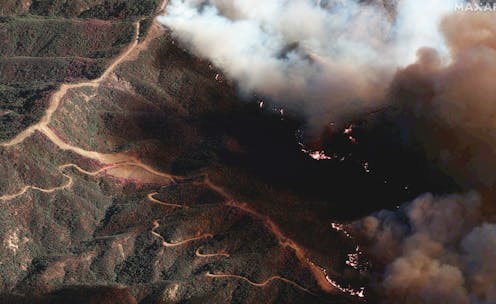California wildfires force students to think about the connections between STEM and society
- Written by Erika Dyson, Professor of Religous Studies, Harvey Mudd College

They analyze wildfire data using the Pandas library[32], an open-source data manipulation library for the Python computer programming language.
They also read a Union of Concerned Scientists report[33] examining fossil fuel companies’ culpability for increased risk of wildfires. And they analyze the environmental historian William Cronon’s classic indictment[34] of the environmentalist movement for romanticizing an idea of a pristine “wilderness” while absolving themselves of the responsibility to protect the rest of nature – humans, cities, farms, industries.
We also examine poetry by Ada Limón[35], indigenous ecology[36] and Engaged Buddhism[37].
What will the course prepare students to do?
The final assignment for the course asks students to critically analyze a proposed intervention dealing with growing California wildfire risk using the disciplinary tools they have learned.
For example, they could choose the increased deployment of “beneficial fires” to reduce flammable biomass in forests[38].
For this intervention, we expect that students would address topics like the historical erasure of Indigenous knowledge[39] of prescribed burning, financial liabilities associated with controlled burning,[40] and scientific research on the efficacy of beneficial fires[41].
References
- ^ Uncommon Courses (theconversation.com)
- ^ STEM & Social Impact: Climate Change (docs.google.com)
- ^ Harvey Mudd College’s mission (www.hmc.edu)
- ^ Core Curriculum (www.hmc.edu)
- ^ biology (www.hmc.edu)
- ^ chemistry (www.hmc.edu)
- ^ computer science (www.hmc.edu)
- ^ mathematics (www.hmc.edu)
- ^ media studies (www.hmc.edu)
- ^ political science (www.linkedin.com)
- ^ religious studies (www.hmc.edu)
- ^ science, technology and society (www.hmc.edu)
- ^ California wildfires (theconversation.com)
- ^ in 1911 (archive.org)
- ^ F. E. Olmsted (academic.oup.com)
- ^ Social Darwinist (www.britannica.com)
- ^ light burning (theconversation.com)
- ^ Native Americans (research.fs.usda.gov)
- ^ enormous amounts of carbon and other particulate matter (theconversation.com)
- ^ Public distrust of science is increasing (www.pewresearch.org)
- ^ drones for search and rescue (www.latimes.com)
- ^ since at least 2015 (pulitzercenter.org)
- ^ drones flying over populated areas (www.pewresearch.org)
- ^ snooping drones (pulitzercenter.org)
- ^ government concerns about data collection (techcrunch.com)
- ^ strict drone policies (techcrunch.com)
- ^ low-income and rural Americans (calmatters.org)
- ^ watch two (www.pbs.org)
- ^ documentaries (www.nationalgeographic.com)
- ^ 2018 Camp Fire (abc7.com)
- ^ AP Photo/Noah Berger (newsroom.ap.org)
- ^ Pandas library (pandas.pydata.org)
- ^ Union of Concerned Scientists report (www.ucsusa.org)
- ^ classic indictment (www.journals.uchicago.edu)
- ^ poetry by Ada Limón (europa.nasa.gov)
- ^ indigenous ecology (fore.yale.edu)
- ^ Engaged Buddhism (www.lionsroar.com)
- ^ “beneficial fires” to reduce flammable biomass in forests (wildfiretaskforce.org)
- ^ the historical erasure of Indigenous knowledge (www.frames.gov)
- ^ financial liabilities associated with controlled burning, (wildfiretaskforce.org)
- ^ the efficacy of beneficial fires (tendingtheland.org)
Authors: Erika Dyson, Professor of Religous Studies, Harvey Mudd College

